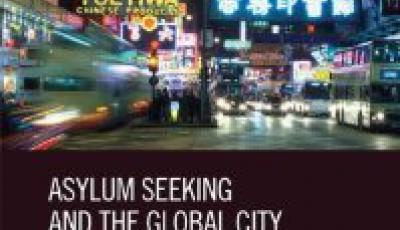Research Notes is Border Criminologies’ new ‘mini-post’ series on recent publications about border control. In this installment, Francesco Vecchio describes his new book, Asylum Seeking and the Global City, that has been published in the series, Routledge Studies in Criminal Justice, Borders and Citizenship. Francesco is a postdoctoral research fellow at Charles Sturt University, Australia, and collaborates with Fondazione ISMU and Hong Kong-based NGO Vision First.
The role of academics often overlaps that of advocates. Research lays the foundation upon which others may build their work to advance the interests of both governments and the people who are often constituted as undeserving of membership in a host society. At a time of rapid socioeconomic and political change, when marginalizing and precarious human conditions are exacerbated by global economic austerity, the lives of numerous travellers are increasingly affected by an armoury of exclusionary mechanisms allegedly aimed at shielding established wealth from the threat of unwelcomed vagrants. My new book, Asylum Seeking and the Global City, draws upon extensive ethnographic work and in-depth knowledge of seeking protection in Hong Kong to examine the illegalization of one group of disenfranchised travellers, namely asylum seekers. Noting that public policies and individual practices effectively construct asylum seekers as criminals while confining them to specific, immiserating socioeconomic and political spaces, this book analyzes asylum seekers’ day-to-day social interactions in order to fully appreciate the causes and nature of their alleged deviance and hence develop an analytical perspective that escapes narrow characterizations of the asylum sphere.

Asylum Seeking and the Global City illustrates the struggles, resourcefulness, and assets that asylum seekers, who are inadequately assisted while denied the right to work, rely upon to interpret their surroundings, frame their choices, and evaluate the consequences of their actions, thus bypassing the many roadblocks they encounter to gain a measure of control over their lives. In so doing, book reveals the entrepreneurial drive and the complex agency of the global city, whereby less affluent and professionally qualified residents cannot be said to contribute less to urban world-class development than the more visible global elites who control much of the world’s economy. Asylum seekers are definitively one such a group, despite or perhaps precisely because they are structurally compelled to negotiate their survival at the very bottom of Hong Kong society.
See also other Research Notes mini-posts:
- Research Notes: Race, Gender and the Body in British Immigration Control
- Research Notes: The EU’s Response to Irregular Migration and the Problem of Criminalisation
Want to read more research on border control? Check our our new open access SSRN research paper series on Criminal Justice, Borders and Citizenship. Have an article or publication you'd like to summarise? Get in touch with us! Send us an email, or post a comment here or on Facebook. You can also tweet us.
__________
How to cite this blog post (Harvard style):
Vecchio F (2014) Research Notes: Asylum Seeking and the Global City. Available at: http://bordercriminologies.law.ox.ac.uk/research-notes-global-city/ (Accessed [date]).
Share:








